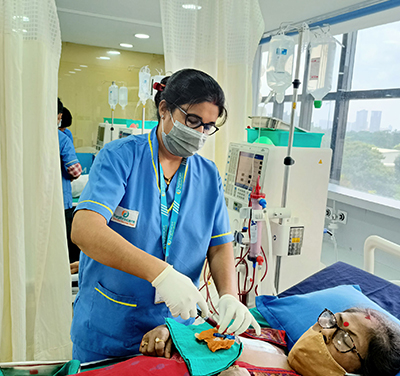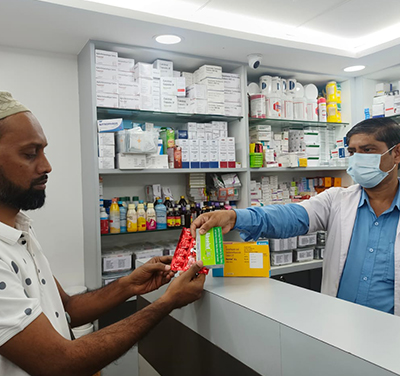CKD or Chronic Kidney Diseases are at a rise globally as well as in India. In India the risks of kidney trouble leading to chronic stages is becoming more and more common every day. The main cause for this is a lack of general awareness. This is exactly what the Kidney Care Society has been doing for the past seven years, spreading the light of awareness where previously there was only darkness of ignorance. Our approach has been two-pronged from the very start. Prevention and Early Detection are the paths that we have chosen to combat this silent killer. We have arranged a number of awareness camps and workshops over the past few years and managed to establish the danger of kidney diseases to common people, medical practitioners, health care sector workers and many more. We are fortunate that our efforts have not been in vain. We have managed to detect many cases of Kidney diseases at different stages and screened several thousand people. Our mission is to establish a model system meeting all possible standards for renal care and bridge the knowledge gap to prevent the spread of this silent killer.

Conservative Nephrology
Chronic kidney disease is a complex disease with multifaceted etiology. We provide holistic care for renal failure patients that include consultation, treatment, and yoga.
Diabetic kidney disease- Diabetes is the leading cause of kidney disease. About 1 out of 3 adults with diabetes have kidney disease.
Hypertension Nephropathy- It is a chronic condition and it is a serious risk factor for the development of end-stage kidney disease
Glomerular disease- This is a common cause of chronic kidney disease. Among patients on dialysis, about 15 percent have a diagnosis of glomerulonephritis.
Genetic kidney disease- ADPKD is the most common type of inherited kidney disease and it is the fourth leading cause of kidney failure.
Lupus nephropathy- This causes kidney inflammation | blood in the urine | protein loss| high blood pressure| impaired kidney function | and kidney failure.

Renal Transplant Clinic
We perform all kinds of Kidney transplantation along with pre and post-donor and recipient evaluation.
Living donor renal transplantation- when a kidney from a living donor is removed and placed into a recipient whose kidneys no longer function properly
ABO-incompatible transplantation- transplantation across the blood group is done
Deceased donor transplantation- when a kidney from someone who has recently died due to brain death, is removed and placed in a recipient in need of kidney transplantation.
Highly sensitized transplantation- transplantation for patients who have exceptionally high antibody levels.

Urology Clinic
Our Urology Clinic is the one-stop solution for any urological disorder. We provide holistic care to patients with urological problems too.
Kidney stone- treatment for nephrolithiasis (hard deposits made of minerals and salts that form inside your kidneys)
Benign prostate hyperplasia- BPE is common in men aged over 50. It is a condition that can affect how you urinate.
Other urological disorders: urinary stricture,bladder outlet obstruction,vesicoureteric reflux,congenital disorders

Vascular Surgery Clinic
Our extremely skilled vascular surgeons performs dialysis access creation with utmost care followed by post-treatment.
AVF fistula creation- a surgery to connect an artery to a vein for patients with end-stage renal disease in order to receive dialysis.
Dialysis access creation- There are 3 types of access creation, called a fistula, a graft, and a catheter.

Hemodialisis
We hold an advanced-level dialysis unit along with skilled technicians, under the supervision and care of doctors. Both chair and bed facility is available.
HemoDialysis(HD)- It is one way to treat advanced kidney failure and can help you carry on an active life despite failing kidneys.
Plasma Pheresis (Therapeutic Plasma exchange)-It is performed especially to remove antibodies in treating autoimmune conditions.
Hemo Perfusion- is an extracorporeal blood purification modality that contains adsorbent particles.
Sustained low-efficiency Dialysis (SLED)- This is an increasingly popular form of renal replacement therapy for patients with renal failure in the intensive care unit.
HemoDia filtration (HDF)-It is usually used to treat acute kidney injury (AKI), but may be of benefit in multiple organ dysfunction syndrome or sepsis.
Intermittent Peritoneal Dialysis (IPD)- This is an old dialysis modality involving thrice-weekly therapy in a hospital or dialysis center setting.

Clinical Nutrition and Lifestyle Education
Management of chronic Kidney disease is not limited to only pharmacotherapy.It must be managed holistically.Nutrition is an integral part of treatment.We provide nutritional support for diabetic kidney disease,hypertensive nephropathy,glomerular disease,renal transplant recipient,hemodialysis patient,IgA nephropathy,Lupus nephropathy,ADPKD.
Other nutritional services
- Nutritional support for weight loss/weight gain
- Body composition analysis
- Anthropometry
- Lifestyle education and support

Lifestyle and Rehabilitation Program
We also provide one on one yoga session to our patients. Patient is first assessed and based on that,yoga is prescribed.A dedicated trained is allocated for regular follow up.Both online and offline sessions are available
We also provide Rehabilitation support
- Nutritional support for weight loss/weight gain
- Body composition analysis
- Anthropometry
- Lifestyle education and support
Book a Consultation Now- +91 80170 41315

Carepath Diagnostics
We are equipped with advanced diagnostic facilities with all modern high end machinaries.We do following investigations
- Biochemistry
- Clinical pathology
- Microbiology
- Transplant immunology
- Drug level monitoring
Report is delivered on the same day.
Home collection facility available | Book Now
Saltlake- +91 80177 56196
Chandannagar- +91 6292340848
Alipurduar- +91 6292 340 843

Digital Radiology
We are one of few centres with digital radiology where xray image is immediately sent to mobile.No need to wait for long time.We are also equipped with world class Echo and Usg machine.We do following test
- USG (whole abdomen, KUB)
- Dopplerof kidney and graft kidney,
- Doppler study of all limbs,
- Doppler of AVF,Doppler of renal artery)
- 2D echo
- Digital X-Ray (Chest,KUB,LS spine,Pelvis,abdomen,lumber spine,knee
joints,PNS,wrist,ankle)

Cardiology
Following test is done in our cardiology unit.
ECG- is a simple test used to check your heart’s rhythm and electrical activity.
Holter monitoring- A test with the help of electrodes and a recording device to track the heart’s rhythm.
Ambulatory BP monitoring- It’s a useful way to detect white coat hypertension, masked hypertension, and sustained hypertension.

O.T. Facility
We have an OT equipped with all modern equipments and amenities.Following procedures are done
- A.V. Fistula
- DJ Stent Removal
- Jugular catheter insertion
- Kidney biopsy

Women Welfare
Women’s well-being refers to the physical, mental, and emotional health of women, as well as their ability to live a full and meaningful life. Women’s well-being can be influenced by a variety of factors, including their environment, lifestyle, genetics, and social and economic factors.
Definition: Women’s well-being encompasses many aspects of health and wellness, including reproductive health, mental health, nutrition, exercise, and social support. It’s important to address all of these factors in order to promote women’s overall well-being.
Awareness: Awareness of women’s well-being is important because many women face unique health challenges that can impact their quality of life. These challenges include reproductive health issues such as menstrual disorders, infertility, and menopause, as well as mental health issues such as anxiety, depression, and postpartum depression. Women also face a higher risk of certain conditions such as breast cancer and osteoporosis.
Causes: The causes of women’s well-being issues can vary depending on the specific condition. Some of the factors that can contribute to women’s health issues include hormonal imbalances, genetics, lifestyle factors such as diet and exercise, environmental factors such as pollution and exposure to toxins, and social and economic factors such as poverty and discrimination.
Nutrition plays a vital role in women’s well-being, as it affects overall health, including reproductive health, bone health, and mental health. Proper nutrition can help prevent chronic diseases, boost energy levels, and improve mood and cognitive function. Here are some important factors to consider when it comes to women’s nutrition:
- Macronutrients: Women need a balanced intake of macronutrients – carbohydrates, proteins, and fats – to support overall health. Aim to consume complex carbohydrates such as whole grains, fruits, and vegetables, lean proteins such as chicken, fish, and beans, and healthy fats such as nuts, seeds, and avocado.
- Micronutrients: Women also need a range of micronutrients, including vitamins and minerals, to support various bodily functions. For example, calcium and vitamin D are important for bone health, while iron is essential for healthy blood cells. Eating a variety of fruits, vegetables, whole grains, lean proteins, and healthy fats can help ensure adequate intake of these important nutrients.
- Water: Staying hydrated is important for overall health, including proper digestion, circulation, and kidney function. Aim to drink at least 8-10 glasses of water per day, and more if you are active or in hot weather.
- Hormonal Changes: Hormonal changes during the menstrual cycle, pregnancy, and menopause can affect women’s nutritional needs. For example, women who experience heavy menstrual bleeding may need to consume more iron-rich foods, while pregnant women need to consume extra calories and nutrients to support fetal growth and development.
- Lifestyle Factors: Lifestyle factors such as stress, sleep, and physical activity can also affect women’s nutritional needs. For example, chronic stress can lead to overeating or undereating, while regular exercise can increase energy needs and the need for certain nutrients.
Overall, women should aim for a balanced and varied diet that includes plenty of fruits, vegetables, whole grains, lean proteins, and healthy fats. It’s also important to stay hydrated, manage stress, and engage in regular physical activity to support overall well-being. If you have specific nutritional concerns or health issues, it’s always a good idea to consult with a registered dietitian or healthcare provider for individualized recommendations.
Treatment: The treatment of women’s health issues depends on the specific condition and the severity of the symptoms. Treatment options may include medications, lifestyle changes such as diet and exercise, counseling and therapy, and surgical interventions in some cases.
Do’s and Don’ts: Here are some general do’s and don’ts to promote women’s well-being:
Do:
- Get regular check-ups and screenings to monitor your health
- Eat a balanced diet that is rich in fruits, vegetables, whole grains, and lean proteins
- Get regular exercise, aiming for at least 30 minutes of moderate-intensity exercise per day
- Manage stress through techniques such as meditation, yoga, or deep breathing
- Seek medical attention promptly if you notice any changes in your health
Don’t:
- Smoke or use tobacco products, as they can increase the risk of various health issues
- Engage in risky behaviors such as unprotected sex or drug use
- Ignore symptoms of health issues, such as abdominal pain, irregular periods, or mood changes
- Neglect your mental health – seek support and treatment if you are experiencing anxiety, depression, or other mental health issues
In conclusion, women’s well-being encompasses many aspects of health and wellness, and is influenced by a variety of factors. It’s important to be aware of women’s health issues and to take steps to promote overall well-being through healthy lifestyle choices, regular check-ups and screenings, and prompt medical attention if needed.

Other Services
Pulmonary function test- The tests measure lung volume, capacity, rates of flow, and gas exchange.
EMG/NCV-testing is used to diagnose disorders of the nerves and muscles, testing for neuropathies, carpal tunnel syndrome, sciatica, and neck and spine conditions.
Uroflowmetry-a test that measures the volume of urine released from the body, the speed with which it is released, and how long the release takes.
EEG-a test that measures electrical activity in the brain using small, metal discs (electrodes) attached to the scalp.
Polysomnography- a comprehensive test used to diagnose sleep disorders.
Retinal screening (Diabetic retinopathy)-It’s caused by damage to the blood vessels of the light-sensitive tissue at the back of the eye (retina).
Caremeds Pharmacy
Medicine at door step | Book Now
Saltlake- +91 6292252943
Ngerbazar- +91 6292252950
Chandannagar- +91 6292 260 421
Alipurduar- +91 6292 340 842


